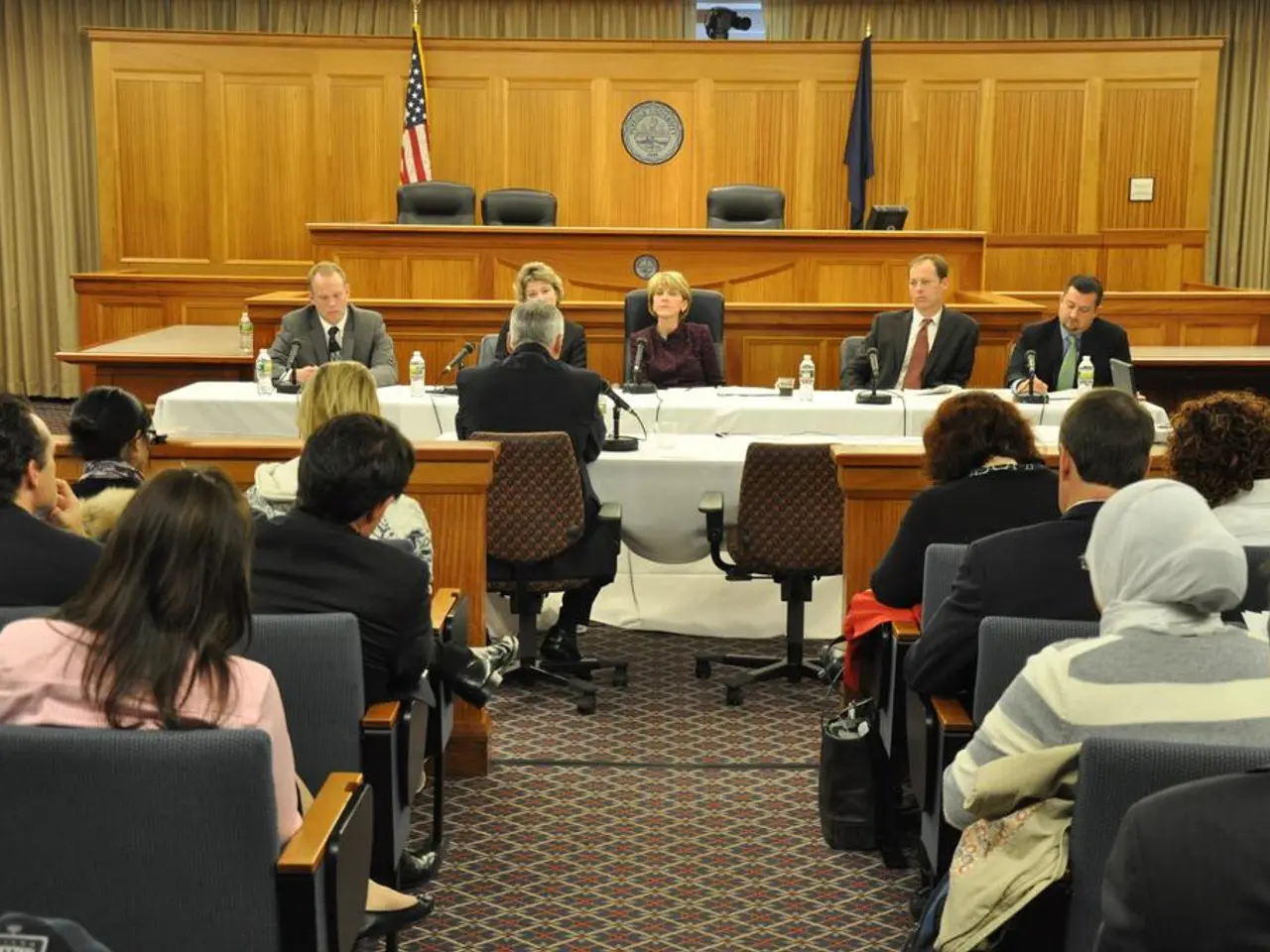Final opportunity for negotiations on the United Nations Plastics Treaty
Headline: Global Negotiations Underway to End Plastic Pollution with Ambitious Treaty
The world is witnessing a critical moment in environmental history as over 170 countries gather in Geneva to negotiate a legally binding treaty aimed at ending plastic pollution. The treaty, being discussed at the INC-5.2 conference, seeks to address the full lifecycle of plastics, from design and production to consumption and disposal [1][2][3].
The proposed agreement is a significant step towards addressing the mounting issue of plastic pollution, which threatens ecosystems, human health, and global supply chains. According to the United Nations Environment Programme (UNEP), 400 million tons of plastic waste are likely to end up as waste, and without measures, the amount of waste will triple by 2060 [4].
Key players in the negotiations include the European Union, which is advocating for an ambitious treaty covering the full plastic lifecycle and phasing out certain hazardous plastics. Commissioner Jessika Roswall represents the EU at the ministerial segment [3][5]. The High Ambition Coalition, comprising countries like the UK, is pushing for strict measures, including production caps on fossil-fuel-based plastics. However, some oil-producing states, such as Saudi Arabia, Russia, Iran, and Kuwait, are resisting these ambitious measures [2].
The treaty aims to tackle plastic pollution systemically rather than relying solely on recycling. It proposes regulatory measures across the entire plastic lifecycle, including ecological design and clear labeling, and supports developing countries in adopting sustainable practices [3][4]. However, disagreements persist over whether to impose a cap on plastic production, restrictions on chemical additives, and financing and implementing responsibilities for effective global governance [2][4].
The negotiations, which started on August 5 and will continue until August 14, involve more than 160 countries, hundreds of environmental organizations, and industry lobby groups. China, the world's largest plastic producer, has already planned national production restrictions. Germany, the largest plastic waste exporter in Europe, is also present, but the EU will negotiate for all member states [1][6].
If an agreement is reached, there will be a diplomatic conference next year for signing, followed by ratification in individual countries, which could take several years. The stakes are high, as plastic particles are polluting every ecosystem on Earth and affecting humans. Microplastics, for instance, have been found in arteries, livers, and brains, and can enter the body through food, water, and air [7].
The negotiations are not without challenges. The U.S. government under Donald Trump is dismantling regulations, complicating the negotiation process. Furthermore, the debate includes setting desired goals versus clear, binding measures. UN Environment Programme (UNEP) chief Inger Andersen acknowledged differences between delegations at the start of the negotiations [8].
Despite these challenges, the global community is hopeful that a coordinated, legally binding framework will be established to address plastic pollution comprehensively. The implications of such an agreement could revolutionize environmental protection, human health, and global supply chains.
References: 1. BBC News. (2025, August 5). Plastic pollution: The global treaty being negotiated in Geneva. BBC. Retrieved from https://www.bbc.co.uk/news/science-environment-58225783 2. The Guardian. (2025, August 7). Oil-producing countries block ambitious plastic treaty at Geneva talks. The Guardian. Retrieved from https://www.theguardian.com/environment/2025/aug/07/oil-producing-countries-block-ambitious-plastic-treaty-at-geneva-talks 3. Reuters. (2025, August 8). EU pushes for ambitious plastic treaty at Geneva talks. Reuters. Retrieved from https://www.reuters.com/article/us-plastic-pollution-geneva-idUSKCN25S23G 4. UNEP. (n.d.). Plastics in the Environment. United Nations Environment Programme. Retrieved from https://www.unep.org/resources/themes/chemicals-and-waste/plastics-environment 5. European Commission. (n.d.). EU's commitment to addressing plastic pollution. European Commission. Retrieved from https://ec.europa.eu/environment/circular-economy/plastics/index_en.htm 6. Deutsche Welle. (2025, August 10). Germany's plastic waste export problem. Deutsche Welle. Retrieved from https://www.dw.com/en/germany-s-plastic-waste-export-problem/a-59554715 7. World Health Organization. (2021, December 15). Microplastics in drinking-water: What are they and what do we know about their health effects? World Health Organization. Retrieved from https://www.who.int/news-room/q-a-detail/microplastics-in-drinking-water 8. The New York Times. (2025, August 12). U.N. Officials Acknowledge Differences in Plastic Pollution Treaty Talks. The New York Times. Retrieved from https://www.nytimes.com/2025/08/12/climate/un-plastic-pollution-treaty.html
- The proposed treaty in Geneva, aimed at ending plastic pollution, includes discussions on the full lifecycle of plastics, from design and production to consumption and disposal, encompassing environmental-science and general-news.
- The European Union is advocating for an ambitious treaty that covers the full plastic lifecycle, including phases like ecological design and clear labeling, which reflects health-and-wellness, science, and business.
- The High Ambition Coalition, comprising countries like the UK, is pushing for strict measures in the treaty, including production caps on fossil-fuel-based plastics, demonstrating their commitment to climate-change mitigation and industry regulations.
- Some oil-producing states, such as Saudi Arabia, Russia, Iran, and Kuwait, are resisting these ambitious measures, sparking debates in the industry and finance sectors about the future of plastics production and sustainability.
- The negotiations involving over 160 countries, hundreds of environmental organizations, and industry lobby groups, delve into aspects of education-and-self-development, as well as lifestyle choices, that impact plastic consumption and waste management.
- Microplastics, a significant concern in the health-and-wellness industry, have been found in various organs of the human body, hinting at the urgent need for the treaty to be finalized and implemented in various countries, including sports medicine and general-news discussions.
- The successful establishment of a coordinated, legally binding framework to address plastic pollution comprehensively could revolutionize environmental protection, human health, and global supply chains, impacting the technology, business, and finance sectors, while also offering potential opportunities for innovation and growth within the industry.




